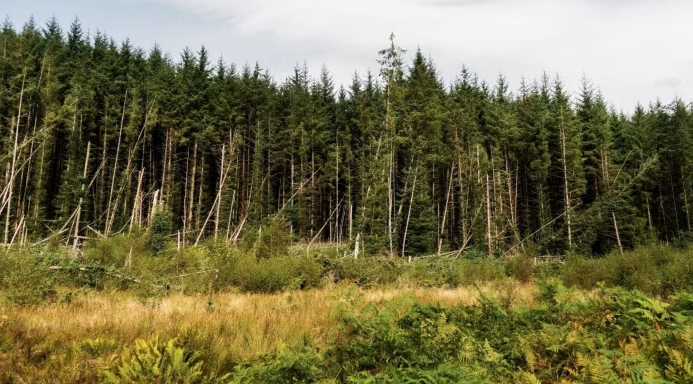November 27, 2025 | 15:01 GMT +7
November 27, 2025 | 15:01 GMT +7
Hotline: 0913.378.918
November 27, 2025 | 15:01 GMT +7
Hotline: 0913.378.918

Commercial forests are not as pretty as broad-leaf forever forests, but more financially attractive. Photo: Bloomberg
Land is a scarce resource. It is needed to produce food and lumber, provide natural habitats, capture CO₂ and even grow biofuels. Farms and villages are also intimately woven with the character of the nation. So it is no wonder that policymakers are concerned about skewed incentives to turn farmland into carbon-offsetting forests.
But — at the margin — sustainable forestry is an opportunity for the UK. The issue is that the lowest quality 20 per cent of UK farmland only produces 1 per cent of what Britons eat, says Dustin Benton at the Green Alliance. Low productivity of the land itself means a small upland farm — call it 70 hectares or so — might make £14,000 a year including subsidies.
The net present value of such an income stream — even if one assumed it grew with inflation and used a risk-free cost of capital of 5 per cent — would be about £7,000 per hectare.
Now compare that with sustainable commercial forestry, practised by funds such as Foresight. Roughly speaking, tightly packed, fast-growing trees might deliver up to 400 tonnes of wood per hectare by 2050, and for each rotation of 35-40 years. Say the price of wood rose by 2 per cent a year, and discount the value of these crops to today, and they might approach £20,000 per hectare.
On top of that, each hectare might receive 250 tonnes of voluntary carbon credits for captured CO₂, which at roughly £20/tonne would add £5,000.
Commercial forests are not as pretty as broad-leaf forever forests, but these would be less financially attractive. They would need the price of carbon credits to rise substantially to make economic sense.
Forestry is an opportunity only for the lowest quality farmland, of course. Arable land, particularly at scale, is much more productive — and hence valuable — than small upland holdings. The fact that this sort of switch makes sense only at the margin is, lovers of rural landscapes would agree, a point in its favour.

(VAN) A new study reveals how the simultaneous effects of ocean acidification, salinity and loss of oxygen are making the world more fragile.

(VAN) Hopes are growing that the creation of the first 3D turkey gut model could be a turning point in the battle against the virulent blackhead disease.

(VAN) Tyson, America’s biggest meat supplier, plans to shutter one of its largest beef processing plants as the industry continues to struggle with low cattle supplies and political pressure from Washington.

(VAN) New FAO study shows how digital solutions are empowering farmers and fishers to prevent losses and build resilient agrifood systems.

(VAN) Brazil's COP30 presidency pushed through a compromise climate deal on Saturday that would boost finance for poor nations coping with global warming but that omitted any mention of the fossil fuels driving it.

(VAN) Poultry farmers in the UK have been warned that they could face one of the worst winters yet for bird flu.

(VAN) Prices of main-crop paddy have risen sharply, with jasmine rice hitting 16,100 baht per tonne — the highest level in years.